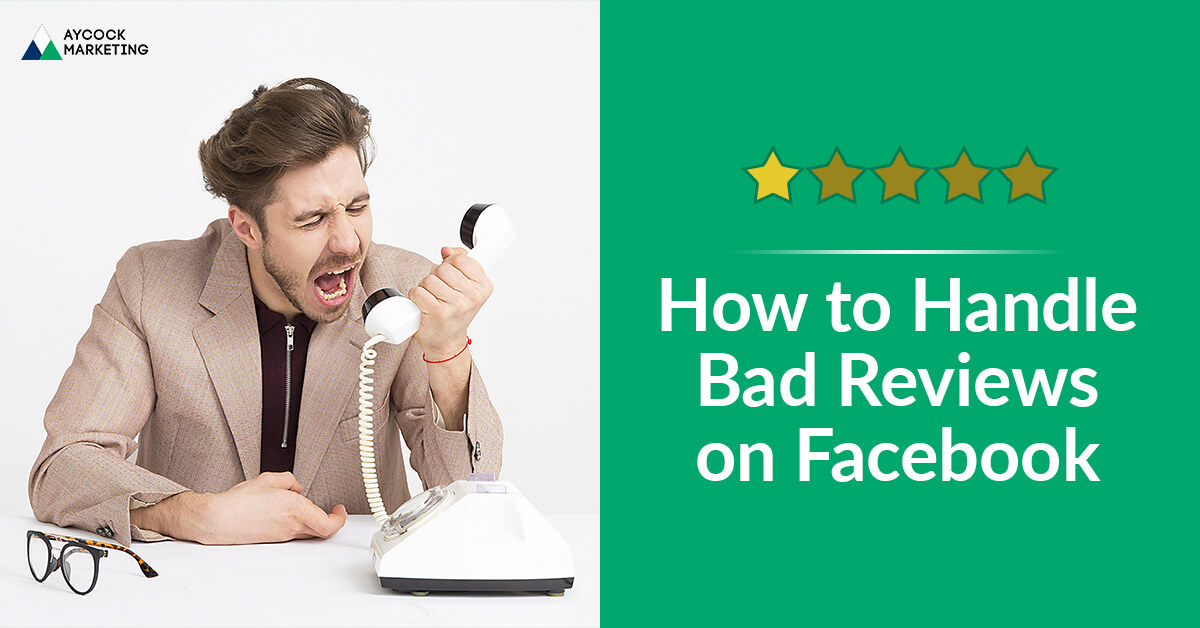If you run an established local business, you’ve probably experienced customers (or even people that haven’t even visited your local business) leaving an occasional bad review on your business’s Facebook Page. It’s alarming and kind of hurts inside when you open up your phone or laptop to find these bad reviews. You’ve spent your hard-earned money and time on training employees and running the business you love. Yet, someone isn’t happy and they’re ready to tell the world through social media channels like Facebook.
It might make you wonder… “How can I get a bad review removed from Facebook?” or… “Can I just delete my Facebook Page all together?”.
Well, they don’t let your delete bad reviews. And that’s just how it is. I don’t think it’d be right for them to allow you to remove bad reviews anyway. And you DEFINITELY don’t want to delete your Facebook Page… otherwise, people will wonder if you’re even open for business!
In this article, I’ll go over our method of how to handle bad reviews on Facebook so you can keep your Facebook Page healthy and your customers coming through those doors!
What Most Businesses Do When They Get a Bad Review on Facebook
Most businesses ignore bad reviews. This is a TERRIBLE idea mainly because it shows future potential customers that you don’t care about them and that you aren’t interested in solving any problems they may have if they arise. This is a huge turn-off and could result in your business becoming stagnant or decreasing in revenue.
The 2nd thing most businesses do is replying and essentially telling the customer they’re wrong. Trying to explain ‘your side of the story’ will only make them become defensive and want to reply in an argumentative way. A public thread on social media is not the place to have an argument – it’s just not classy. And it’s definitely not the place to show your butt to your customers. You wouldn’t argue with a customer in front of all your other customers in your store, so don’t do it online. Avoid trying to prove them wrong at all costs or it will cost you money in the future by creating a scene online for everyone to see.
So how do you handle bad reviews on Facebook anyway? Let’s go over our roadmap so you don’t mess up! Following our method will lead you to transform unhappy customers to happy ones, and could actually help you increase your sales!
Try this First – Comment Publicly: Apology + Empathy + Call to Action
The first thing you should do is comment publicly on the customer’s negative review or recommendation. There are eyes on you so it’s important that you reply with care. We recommend this formula:
Apology + Empathy + Call-to-Action = Resolution
If you follow this formula correctly, you’ll be on your way to resolving problems and potentially creating new lifelong customers. Let’s break down each part of this formula…
- Apologize: A sincere apology means admitting to a fault and accepting that you/your employee/your business has either done wrong and that you could do better. You must take the blame, or this won’t work. Also, make sure you address them by their first name. A simple yet effective way of phrasing would look like this: “Hi Bill, we’re sorry the food we brought out to your table was cold. We could definitely do a better job of that and plan to have a talk with our employees about this issue early this week.” – This shows that you understand you screwed up and shows that you plan to do something about it internally to avoid having the problem happen again.
- Show Empathy: Empathy means “the ability to understand and share the feelings of another”. You must let them know you understand how they feel. This positions you as a guide and lets them know they’re not completely alone/lets them know they’re not completely crazy. A good way to phrase this would be “We’ve experienced this in restaurants before as well and understand that it can be frustrating.” It may help to call out the emotional feeling they are likely having too.
- Call them to Action: Usually when we say “Call to Action” we mean it in a marketing/sales way – “Call now!”, “Buy now!” are a couple of common ones. But when commenting on a bad review, you should tell them what the next step is to solve their problem. The goal here is to redirect them into a private conversation and away from a public conversation. As it stands, they’ve commented publicly for the world to see. We suggest you advise them to reach out to you via phone, email, or Facebook Messenger so you can make it up to them and try to make things right. So your comment might look like this: “Please give me a call at (555) 555-5555 or an email at paul@mybusiness.com and I will personally talk with you and do what I need to to make things right”.
Once you’ve followed this formula, your final comment should look something like this:
“Hi Bill, we’re sorry the food we brought out to your table was cold. We could definitely do a better job of that and plan to have a talk with our employees about this issue early this week. We’ve experienced this in restaurants before as well and understand that it can be frustrating. Please give me a call at (555) 555-5555 or an email at jane@mybusiness.com and I will personally talk with you and do what I need to to make things right”.
The benefit of doing this is not only in helping your customer that has a problem, but it’s also in what the public sees. What does this tell the public eye? It tells them “Wow, this business owner is very humble and is willing to address issues straight on. I’ve got to try this business.” It helps lower the risk people feel they have of trying a new business and being disappointed. It lowers the barrier and makes it a more viable option when researching places to do business.
Great work! Hopefully, this worked for you and the customer reaches out and everything gets resolved. If they don’t respond AND don’t reach out to you, that’s okay… You can let it be. Your comment still lives there for others to see and it shows them you tried to help. Others seeing the comment will only assume the person reached out and you made things right.
…But what happens if they comment and they’re still mad/disappointed/flustered/etc.?
Next, Try This: Comment Again
Let’s say the customer is still mad and pretty much just ignores your first comment and continues to rant. Let’s give them the benefit of the doubt… they may not have cooled off about things yet. Think about a time something made you so mad… it may have taken you a few days to cool down. Considering this, the next thing to do is to comment again and restate that you’d like to help them. Don’t copy and paste your first comment because that will just make you look lazy… but rephrase it and let them know you’d like to help solve the problem. Here’s an example: “Hi Bill, we can see why you may still be frustrated. Our offer still stands because we want to make things right. Please reach out to us via phone at (555) 555-5555 or email at jane@mybusiness.com and we’ll be happy to talk with you personally and resolve the problem. Thank you.“
You’ve reminded them you’re willing to help when they’re ready. Hopefully, this works and the customer will contact you privately. If they never respond or reach out, there’s not a whole lot you can do. You’ve tried to make amends and they ignored it. You will at least continue to be respected as a business that tries to take care of their customers.
That Didn’t Work… They Commented Again with More Negative Remarks! What next?
Okay, so what happens if they reply to your 2nd comment and continue to rant about how crappy your business is? To most of us, these are fighting words! It will make you want to reply and give them a piece of your mind! But whatever you do, don’t give in to that temptation. We recommend to NEVER comment more than 2 times to an unhappy customer publicly. You’ve tried twice to move the conversation into a private situation and they haven’t budged. This is what we call an “On-Stage Hater”. We got this term from Jay Baer’s book “Hug Your Haters“. These types of people want an audience. They want to make a spectacle out of your public argument for laughs or just because. Don’t let these people win by replying a third time. At this point, you’ve tried your best and you should ignore their future comments on that thread. Everyone else watching your negative review now and in the future will see that you tried to fix the problem and the person was completely unruly and didn’t want to accept your help. That’s okay! It makes you look good and makes them look bad!
I hope you’ve found this article helpful. If you have questions about replying to bad reviews on Facebook, please reach out to us at zander@sharpenmarketing.com. Good luck to you and your business’s reputation management efforts!




